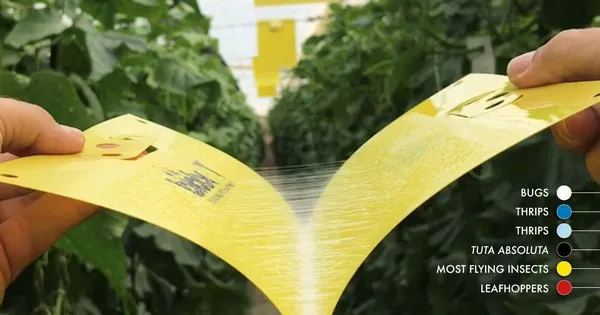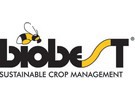“Access to accurate pest data enables growers and advisers to make informed decisions - to design appropriate preventative or curative control strategies and set appropriate introduction rates for beneficials,” says IPM and Pollination Specialist - Arno Hellemons.
Bug-Scan® Yellow
In tomatoes, Bug-Scan Yellow is used for rapid detection and monitoring of whitefly populations. The traps are manufactured from durable recycled plastic and have a non-toxic, long-lasting glue on both sides.

“We recommend installing 40 traps per ha – ideally selecting 1 row per bay to hang out the sticky traps,” says Arno. “Ensure there is a trap at the end of each row and in the front of the row. Positioning-wise, hang them close to the head of the plant. User-friendly, Bug-Scan Yellow traps have an integral hook - making them quick and easy to hang and remove from the crop wire.
“Should the whitefly population be particularly high, it is good practice to replace traps at least every two weeks, and growers should consider installing Bug-Scan Roll Yellow – a roller-trap with a large surface area.”
Rapid Tuta detection
In contrast, the tomato leafminer (Tuta absoluta) is attracted to black - necessitating the use of Biobest sticky trap black.
“We use pheromone dispenser caps with our black traps to attract the male moths,” says Arno. “These sticky plates are slightly larger to optimize capture rates and should be installed horizontally on the slab.
Best practice monitoring
“To gauge the level of pest left over from the previous crops, start monitoring before the new crop arrives,” he advises.
“To get an accurate overview of pest populations, as well as levels of beneficials such as Macrolophus-System, sticky traps should be monitored weekly.”
Latest innovations to help
“Employing artificial intelligence, we are developing Trap-Eye™, offering automated counting of pests and beneficials on sticky traps. In addition, the new PATS-C monitoring system detects real-time flying pests, such as Tuta absoluta, in the glasshouse - allowing earlier and more accurate introduction of biological agents.”
A fixed camera system developed by PATS, a company utilizing high-tech technology to optimize the IPM process, it automatically tracks airborne pest insects active at night. Collecting data daily, it provides high-frequency information about pest presence, population development, and other behavioral characteristics useful for optimizing IPM programs.
“Detecting pests up to a generation earlier, PATS-C can deliver gains of up to 6 weeks for control programs,” says Arno.
“At the end of the day, rapid detection and continuous monitoring of pests remains key to the timely introduction of tailored biological control programs.”

